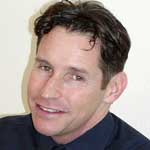-
- Oklahoma gay community criticizing Focus on the Family summit
- Court decision may change vote on anti-gay marriage amendment
- Gay bishop’s safety a concern
- Conservative group pushing ‘marriage protection’ pledge
- Leahy bill would help gay couples stay together
- UA faculty vote to add sexual orientation to anti-bias policy
- Liberal Episcopal priest files lawsuit
- National News Briefs
- World News Briefs
commentary
Catch the real criminals
Published Thursday, 30-Oct-2003 in issue 827
BEYOND THE BRIEFS
The Bush administration deserves credit for cracking down on the producers of hardcore child pornography. Even the Department of Homeland Security has gotten into the act because terrorist groups apparently are involved in the production of child porn to make money to support their efforts.
But in their zeal to catch kiddie porn producers and users, some prosecutors have pursued some cases that didn’t involve child pornography.
A 65-year old New Jersey grandmother faced criminal charges after she took photos of her grandchildren after bathing.
A Kansas mother sued WalMart when it turned over a photo of her naked three-year-old daughter to police.
Federal and state laws provide stiff penalties for possessing even one image of child pornography. The theory is that, by making even the possession of child porn illegal, it will decrease the demand and fewer children will be sexually exploited in the process.
The Supreme Court has held that the First Amendment does not protect child pornography. But defining child pornography is not easy. Congress has tried to make any erotic image of a child — clothed or unclothed, real or virtual, in a porn film or mainstream motion picture — child pornography, but the Court strikes down these laws as being overbroad.
For the past 30 years, there has been a war on hardcore child pornography, but it’s a war we’ve lost badly.
In the U.S., close to one million children a year are subjected to various forms of physical and sexual abuse — and that’s just what is reported to police. One-third of adult women report having been sexually molested as young girls.
The Internet, satellites, and encryption technology have made it easier to access child pornography and evade law enforcement.
For the past 30 years, there has been a war on hardcore child pornography, but it’s a war we’ve lost badly. The child porn kingpins, who kidnap, exploit and abuse kids, are often untouchable because they reside in countries where authorities don’t or won’t enforce child exploitation laws. In the meantime, prosecutors go after anyone who possesses anything resembling an erotic photo of someone who is (or who appears to be) under 18. Grandmothers, artists, commercial bookstores and the like have become fair game in child pornography prosecutions.
California law makes possessing an image of child porn a misdemeanor, but the Legislature may change that to a felony, as most states make it.
Federal law cannot make mere possession a crime, so there has to be some connection with interstate commerce to prosecute.
In U.S. v. McCoy, a judge sentenced a local mother of three to 30 months in prison. One night, Rhonda McCoy was drunk, and she and her 10-year-old daughter posed partially nude with their legs spread, genitals exposed.
The father, Jonathon McCoy, took one photo, which was mixed in with five rolls of film. Rhonda took the film to the Navy Fleet Exchange for processing. An employee of the Exchange notified Naval Criminal Investigation Services of the photograph. Agents from the NIS conducted a search of the McCoy home, confiscating cameras, film, a computer, and numerous photographs.
Despite this massive search, they found no other proof the McCoys were child pornographers.
In January, 2001, Jonathon and Rhonda McCoy were indicted on for “manufacturing child pornography by a parent using materials transported in interstate commerce.” The materials used in interstate commerce were the camera and film, goods transported in interstate commerce.
Jonathon McCoy was acquitted of all counts by a jury, while Rhonda McCoy decided to plead guilty and she hoped for a lenient sentence. She got 30 months.
The Ninth Circuit ruled that the McCoys took some photographs for their home use. There was no allegation that they were commercial pornography producers or distributors, or that they intended to sell the images to anyone. The court noted that the mother was hardly a perfect parent. But she wasn’t a child pornographer.
There’s no question that the McCoys committed crime under California law, arguably child abuse. But this federal case was a waste, especially given the recent findings that, while the feds pursued this case, two of the 9/11 terrorists were here in San Diego planning carnage.
|
|
Copyright © 2003-2025 Uptown Publications


